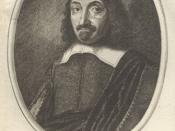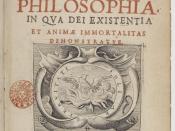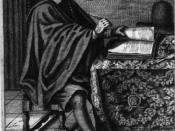�PAGE � �PAGE �1� Descartes
Running head: DESCARTES
Descartes
Jona Boney, Laurie Spivey, Anthony Borromeo,
Jarrod Trantham, Suzie Hunt
University of Phoenix
PHL/215
Dr. Devon Smith
April 9, 2008
The sixteenth and seventeenth century gave birth to a plethora of scientists, innovators, inventors, and thinkers. Among those were Galileo, Newton, Thomas Hobbs and John Locke. The seventeenth century was the beginning of a modern era for France and for most of the eastern world. New revelations were being found. Italy was experiencing their renaissance period climaxing. The average population were considerable prosperous and continuing to grow.
The New World was discovered and their colonizing opened up trading overseas, and bringing barrels of money into France. Inventions like gunpowder and cannons were renovating the arts of war. The Printing Press was giving birth to the media revolution, and allowing books to be made in native languages. People were now able to read self help books, fiction and nonfiction, as well as the bible.
By the time the press started copying the bible for everyone to read, the Thirty Year War was beginning, which took place 1618-1648 (Iannuzzo, C. T., Unknown). The war was a turning point for countries involved. It found an almost crushed Germany surrendering leadership to Sweden who had inherited wondrous power (Sommerville, 2008).
During the seventeenth century, European states began to create conflict with each other. The Dutch, French, Spanish, Portuguese, English, and others were in a constant race to keep up with the latest in technologies, colonization, and trade. Trade held a specific interest in the states eyes. With the new continent now developing and in full swing, Europe's main focus was to set up as many trading posts around the world as possible (Sommerville, 2008).
In the midst of the events taking place around the world,


